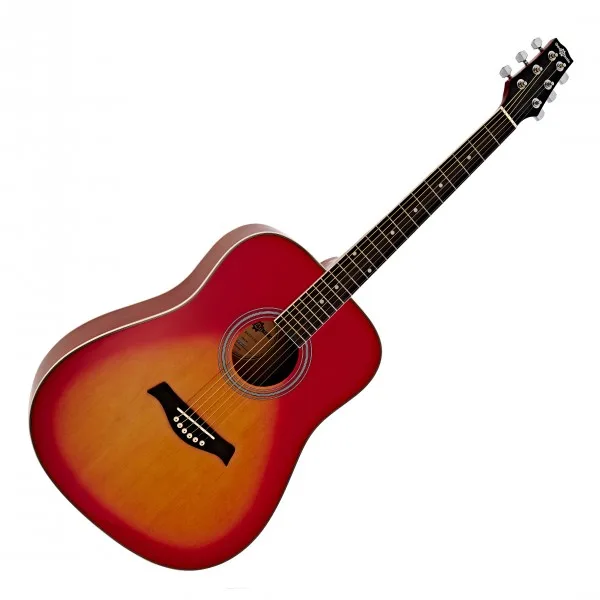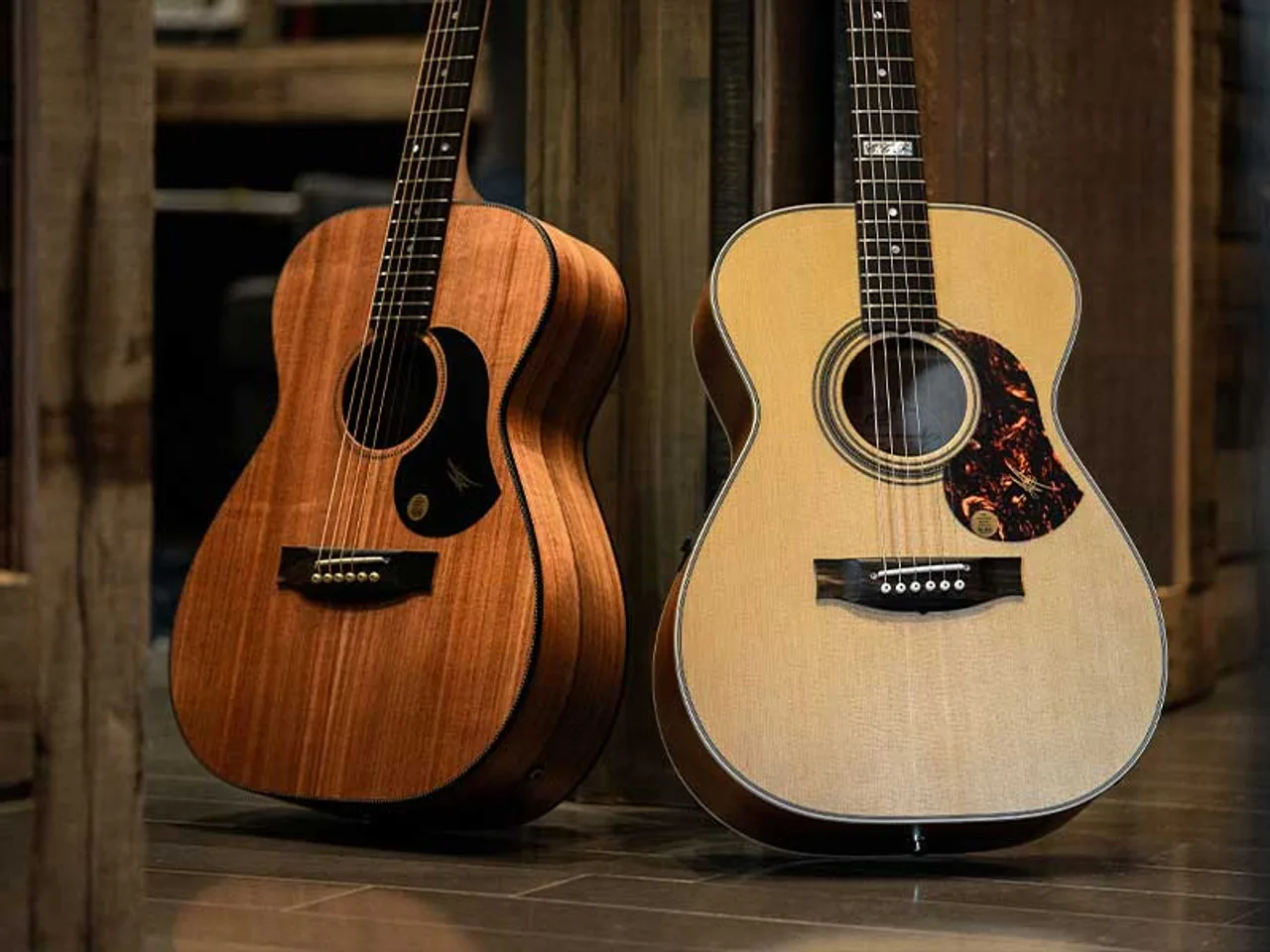Have you always dreamed of playing the guitar? Are you ready to take the plunge and invest in an acoustic guitar but have no idea how much it will cost? Don’t worry, I’ve got you covered! As a musician and guitar enthusiast myself, I know that finding the perfect instrument can be overwhelming, especially when it comes to budgeting. But fear not, because in this comprehensive guide, we’ll dive into everything you need to know about the costs of acoustic guitars.
Together we’ll explore different factors that affect pricing such as materials used, brand reputation, quality vs. affordability trade-offs, and more. By the end of this article, you’ll have a better understanding of what to expect when shopping for an acoustic guitar and be well on your way to fulfilling your musical dreams! So let’s break down all there is to know about how much an acoustic guitar costs.
So, how much does an acoustic guitar cost?
The cost of an acoustic guitar can vary greatly depending on various factors such as brand, quality, materials used, and features. On average, a beginner-level acoustic guitar can range from $100 to $500. However, there are also high-end models that can cost upwards of several thousand dollars.
It is important for beginners to consider their budget and level of commitment before making a purchase. A cheaper guitar may be suitable for those who are just starting out or unsure if they will continue playing long-term. On the other hand, investing in a higher-quality instrument may benefit more dedicated musicians in terms of sound quality and durability.
When looking at prices, it’s also essential to keep in mind that additional accessories such as cases, straps, picks, and tuners will add to the overall cost. It’s best to do some research and compare prices from different brands before making a decision.
Moreover, it’s worth noting that buying a used acoustic guitar can be significantly cheaper than purchasing a new one. However, make sure to thoroughly inspect the instrument for any damages or defects before finalizing the purchase.
In conclusion, while there is no set price for an acoustic guitar as it varies based on individual preferences and needs; with proper research and consideration of budget and commitment level, beginners can find an affordable yet suitable option to start their musical journey with this beautiful instrument.
Understanding the Basic Costs of Acoustic Guitars
Diving into the world of acoustic guitars can be both exciting and overwhelming, especially when it comes to understanding the basic costs. First off, entry-level guitars are incredibly budget-friendly. Typically priced between $100-$300, these instruments are perfect for beginners who want to get a feel for playing without breaking the bank. You’ll find that many of these lower-cost models still offer decent quality sound and build, which makes them ideal for practice sessions at home.
As you progress in your musical journey, you might consider investing in mid-range options that usually range from $400-$1,000. In this price bracket, you can expect better quality materials like solid wood tops instead of laminate ones. These enhancements not only improve sound resonance but also increase durability. Additionally, brands often pay more attention to craftsmanship in this range, offering finer details such as intricate inlays or superior tuners.
When you’re ready to take it up a notch further or if you’re already an experienced player looking for something extraordinary, high-end acoustic guitars come into play with prices starting around $1,500 and soaring upwards into several thousands. What justifies their hefty tags? It’s all about exceptional artistry: handpicked tonewoods like mahogany or rosewood create rich sounds unmatched by cheaper alternatives; plus custom designs cater specifically to versatility and aesthetics.
Understanding these cost tiers helps guide budding musicians through their purchasing decisions while appreciating what each level offers – from affordable yet functional starters to luxurious musical wonders designed for pure auditory bliss.
Factors That Influence the Cost of an Acoustic Guitar
When you’re in the market for an acoustic guitar, numerous factors can affect the price. For starters, the type of wood used is a significant determinant. High-quality tonewoods like mahogany or rosewood tend to be expensive due to their rich sound and durability. On the other hand, guitars made from laminate woods are more affordable but might not offer the same sonic depth and resonance. The craftsmanship also plays a crucial role; handmade guitars crafted by skilled luthiers often cost more than those produced in factories because they involve meticulous attention to detail.
Another crucial aspect is the brand reputation. Well-known brands like Martin, Taylor, or Gibson have built their reputations over decades and often command higher prices due to their reliability and superior quality control. Additionally, features such as inlays, binding materials around the body edges, and even custom designs add layers of cost. Don’t forget about electronics if you’re looking at acoustic-electric models—they typically come with pickups and preamps which add extra dollars to your expense list.
- The type of wood
- Craftsmanship
- Brand reputation
- Add-ons like electronics or custom designs
Ultimately, understanding these factors helps you make an informed decision tailored to both your budget and playing needs.
Read also: what are the best acoustic guitar strings
Breaking Down Brand Reputation and its Impact on Acoustic Guitar Price
When you walk into a music store or browse online for an acoustic guitar, one of the first things you’ll realize is how vastly prices can differ. It’s fascinating to see that some guitars fetch thousands of dollars while others are much more affordable. This disparity isn’t just about the materials used or craftsmanship; brand reputation plays a huge role. Established brands like Martin, Taylor, and Gibson have spent decades building their names and nurturing trust among musicians worldwide. When people buy from these brands, they’re not just paying for wood and strings—they’re investing in a piece of history that promises quality and reliability.
Brand reputation impacts price because it acts as a badge of assurance. Think about it: would you rather spend your money on an unknown brand with no track record or on a trusted name that’s been vouched for by artists time and again? The well-known brands often invest more in research, design innovation, and customer service to maintain their status. This creates:
- Higher perceived value: People believe they’re getting better quality
- Loyalty: Customers stick with what they know works
- Mouth-to-mouth marketing: Satisfied users spread positive reviews.
So next time you’re comparing two seemingly similar guitars but notice a big price gap—remember that you’re also paying for the peace of mind that comes with buying from an established brand.

Assessing Quality Vs. Affordability When Purchasing An Acoustic Guitar
Finding the right acoustic guitar can feel like navigating a maze. On one hand, you want a high-quality instrument that sounds heavenly and lasts forever. On the other, your wallet has its own limits. So, how do you balance these two crucial factors? First off, let’s talk about quality. A good acoustic guitar is usually crafted with attention to detail and high-grade materials. The wood matters a lot—maple or mahogany bodies resonate differently than laminate ones. You’ll notice it in the richness of sound; it’s more full-bodied and nuanced with better wood.
But what if you’re on a budget? Don’t fret; there’s hope! Many brands offer affordable guitars that don’t skimp on essential features. You might not get handcrafted details, but you’ll find reliable instruments made from decent woods like spruce tops paired with NATO or agathist back and sides. Look for features like comfortable neck profiles and decent tuners to keep your playing smooth.
When weighing options:
- Try before you buy: Feel how it sits in your hands.
- Check reviews: Learn from others’ experiences.
- Consider used guitars: They can offer great value at lower prices.
Ultimately, it’s about finding harmony between what sounds good to your ears and feels good to your wallet.
You may also like: how long does it take to tune a piano
Making a Decision to Invest in Your Musical Future with an Acoustic Guitar Purchase
Choosing to invest in your musical journey by buying an acoustic guitar is a thrilling and meaningful step. The instrument’s natural wood tones and simplicity can open up a world of creativity and expression for any aspiring musician. When considering this purchase, think about how the guitar will fit into your life. Do you envision yourself playing at home, serenading friends around a campfire, or perhaps even performing on stage one day? Reflecting on these scenarios can help guide you towards the right type of acoustic guitar that suits both your current needs and future aspirations.
When you’re ready to make the investment, there are several important factors to keep in mind:
- Quality: It’s vital to choose an instrument made from high-quality materials like solid spruce or mahogany for rich sound.
- Comfort: Ensure that the size and shape of the guitar feel comfortable in your hands.
- Tuning Stability: Opt for reliable tuning pegs so your music stays melodious without constant readjustment.
Researching different brands and models will also give you insight into which guitars have lasting value. As you strum those first chords, you’ll be embarking on an exciting adventure filled with melodies and memories—one string at a time.

